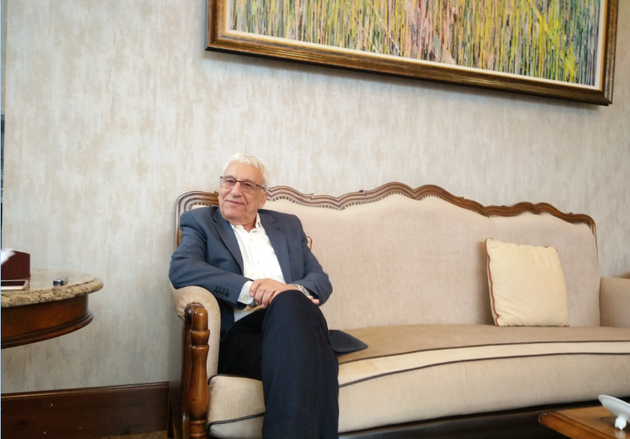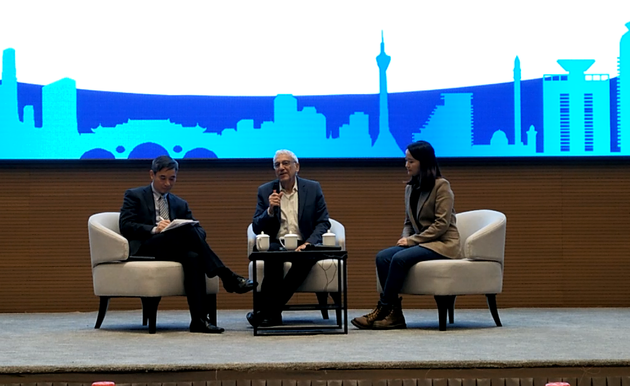
Yigal Erich (Photo/Hu Xiaorui)
Jan. 31 (NBD) -- Some people regard entrepreneurship a game for loners, whereas Yigal Erlich, the founding father of Israeli venture capital industry believes that it's important for entrepreneurs to cooperate with a team in the life-long pursuit of entrepreneurship.
On Tuesday (Jan. 30), Erlich had an exclusive interview with NBD on the sidelines of China-Israel New Economy & Innovation and Incubation Forum held in Southwest China’s Chengdu, sharing his observations on China's environment of innovation and giving suggestions to young entrepreneurs.
At the beginning of the 1990s, Erlich identified the huge need in Israel to establish for the first time a professionally-managed venture capital industry that will fund the exponential growth of high-tech ventures coming out of Israel. He then convinced the Israeli government to allocate 100 million dollars and started Yozma, meaning "initiative" in Hebrew.
When market can't provide what's in need, government should take the lead
NBD: How did you come up with the idea of government-led venture capitals?
Yigal Erlich: It was simple. At that time, there was no venture capitals (in Israel). Small companies got their money from some place, started the idea to develop and then failed, couldn't continue.
The question was why they failed and what we could do as a government to help. And the answer was venture capital. Why? Because venture capitals have not only money but experienced people who can not only give you the money but also help you to create a startup.
So the government said, "OK, we need venture capitals in Israel". Then we started to talk to private businesses, asking them to do venture companies and nobody wanted to do that.
In a way, it was a type of market failure, because the market couldn't create what's needed. At this point, there was a market failure. The government should take the lead and the responsibility to solve the problem.
So the government decided to solve the problem, to be a catalyst. It was not to be the venture capital, but a supplier of money to create other funds.
NBD: Israel carries the title of "The Startup Nation". How does Israel earn that title and what makes a nation take on innovative genes?
Yigal Erlich: The Startup Nation, I think, came from the idea that many Israeli companies were acquired by international companies. So it (Israel) became like a hub and a place where you produce and manufacture companies, like merchandise.
Then you put many companies on the table, and big companies from the U.S., Europe and China come in and say, "OK, this is good and we'll buy it". It's like a factory of ideas. The idea is good for other companies, so they buy it.
The fact is that Israel is small and very entrepreneurial, creates new ideas and sells the startup companies. That is why we are the Startup Nation.
NBD: Globally, we have Silicon Valley in the U.S., Yozma in Israel and Start-UP program in Chile, what kind of model do you think that China can develop in order to fuel entrepreneurship and innovation.
Yigal Erlich: China is a big country and there are differences between different provinces and cities. Each part of China takes its own future in its hand and each province has its own policy.
Chengdu should decide, Sichuan should decide what policy they want to put in place. And according to that, we can see where we can partner and where we can do things with them.
When choosing an investment target, team comes first
NBD: You once said that your success rate of investment is only between 10 percent and 20 percent, but you can get as much as 10-fold earnings from one single successful case. So how do you and Yozma choose which companies to invest in?
Yigal Erlich: To choose the right company is not easy. First you need to be exposed, to see companies, to see people to decide whether to invest.
Most of the venture capitals are judging first according to the team of the startup, (to see) if the team complement with each other, if they know what they are doing, if they had experience together, anything about the team and individuals of the team.
Second, it's technology. The question about technology is whether the market and technology fit together. Sometimes, it's very difficult to predict. And sometimes you see a very nice technology, but the market isn't there. The market is either 10 years ahead or back.
NBD: What are the fields Yozma is mainly interested in? How does Yozma detect the next lucrative investment target, or the investment “bonanza”?
Yigal Erlich: If you look at the past, half of our investment went to the medical companies. If you look at the future, where you think you will be investing is mostly areas where you get more experience and also where the people are, so follow the people. If you think these are good people and you look for a project, then you're set to invest.
For example, if you are in the medical market as a venture capital for a long time, you probably invest in entrepreneurs who turned out successful. Eventually you would invest them next time.
NBD: An increasing number of Chinese young people choose to start their own businesses, but some of them are facing difficulties. What suggestions would you like to give to those young entrepreneurs?
Yigal Erlich: For young entrepreneurs, it's very difficult. Once you decide to be an entrepreneur, devote your life to your idea, it's not easy. You have to understand all the difficulties. Maybe you can't succeed, but you have to stick to the target. Even if you fail, you have to come back again and try again. Because entrepreneurs are people who want to do something by themselves and to create something by their own ability. If you are a real entrepreneur, you have to continue and not to surrender.
It's important for entrepreneurs not to work only alone. They have to cooperate with other people as well. Sometimes, to find a thought, it's better to work in group, with a team. Don't think that only you can be everything. It's better to cooperate, to create teams, small but powerful teams.

Yigal Erlich (Middle) at China-Israel New Economy & Innovation and Incubation Forum (Photo/Hu Xiaorui)
Great potentials lie in cooperation between Chinese and Israeli companies
NBD: What do you think of China's environment for innovation and entrepreneurship in general?
Yigal Erlich: I know about China not only from my visits, but also from Chinese visiting Israel. If you want to compare China with what it was before, it is totally different.
China today is a major player in technology and investment. China has so many engines and universities and it means that the need for new technologies in the future can be met here and it can be a better investment place.
The power of China today is to achieve something with cooperation. Because our size is small and we are entrepreneurial, we still think that innovation, new ideas and entrepreneurs from Israel will be of good value to cooperate with Chinese people and Chinese companies. So the future cooperation between Chinese and Israeli companies can be really big.
NBD: Yozma set up its South Korean branch in 2014, will there be a branch in China in the coming years?
Yigal Erlich: We are a venture capital, and it means that you raise money and you invest them. When you raise the money from investors, they will ask you where you are going to invest this money. (For example) Israeli investors would say that they only give the money to invest in Israeli companies. So I can't use this money to invest in other places.
But what we do in South Korea is a different thing. We don't convince investors to invest there, but we came to start similar operation in South Korea, with local funders. That same thing we can do here as well.
In fact, we are talking with relevant people about what we can do in the future in Chengdu. It's not the question if we have an office or not. It's question if we have a partner here. So we can raise fund and invest here the same as in Israel, and in a way, we can participate in their incubation. This is the beginning.
Email: gaohan@nbd.com.cn


 川公网安备 51019002001991号
川公网安备 51019002001991号





